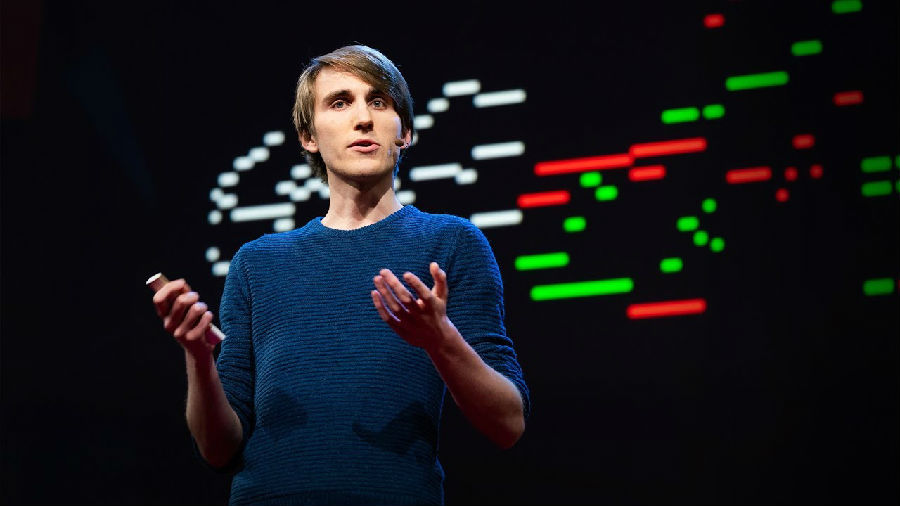(单词翻译:单击)
About two and a half years ago, I watched this movie called "Her."
大概两年半前,我看了《她》这部电影。
And it features Samantha, a superintelligent form of AI that cannot take physical form.
电影里的“女主角”沙曼塔是极度聪明的人工智能,但却并不拥有实体肉身。
And because she can't appear in photographs,
她没办法拥有自己的照片,
Samantha decides to write a piece of music that will capture a moment of her life just like a photograph would.
所以她决定写首曲子来捕捉她生命中的片段,正如拍照一般。
As a musician and an engineer, and someone raised in a family of artists,
我出生于艺术世家,现在是一名音乐家兼工程师,
I thought that this idea of musical photographs was really powerful.
我觉得音乐摄影这个想法很强大。
And I decided to create an AI composer. Her name is AIVA,
所以我决定制造一款会作曲的人工智能。这款人工智能的名字就叫做“AIVA”,
and she's an artificial intelligence that has learned the art of music composition by reading over 30,000 scores of history's greatest.
通过阅读历史上最优秀的三万多首乐谱,她学会了作曲的艺术。
So here's what one score looks like to the algorithm in a matrix-like representation.
如果以这种矩阵似的形式来表现的话,在我们的算法看来,乐谱就是长这样子的。
And here's what 30,000 scores, written by the likes of Mozart and Beethoven, look like in a single frame.
而如果把莫扎特、贝多芬等人写的三万首乐谱同置于一个框架之中,看起来就是这个样子了。
So, using deep neural networks, AIVA looks for patterns in the scores.
利用深层神经网络,AIVA开始从这些乐谱中找出规律。
And from a couple of bars of existing music, it actually tries to infer what notes should come next in those tracks.
从现有音乐中的几个小节,她会推测乐曲中接下来该有什么音符。
And once AIVA gets good at those predictions,
一旦预测变得越来越准确,
it can actually build a set of mathematical rules for that style of music in order to create its own original compositions.
AIVA就开始为该种曲风建立起一套数学规则,并以此写出她自己的原创歌曲。
And in a way, this is kind of how we, humans, compose music, too.
在某种程度上,这其实也是我们人类作曲的方式。
It's a trial-and-error process, during which we may not get the right notes all the time.
这是一种反复试验的过程,我们未必每次都找得到最合适的音符。
But we can correct ourselves, either with our musical ear or our musical knowledge.
但我们可以用我们的音乐知识或耳朵来自我修正。
But for AIVA, this process is taken from years and years of learning,
这需要长时间的学习,但AIVA把段漫长的学习时间,
decades of learning as an artist, as a musician and a composer, down to a couple of hours.
也就是成为艺术家、音乐家、作曲家所需的那几十年学习,浓缩成只有几个小时。
But music is also a supersubjective art.
当然音乐也是个极为主观的艺术。
And we needed to teach AIVA how to compose the right music for the right person, because people have different preferences.
所以我们需要教导AIVA如何为不同的人制作不同的音乐,毕竟每个人的喜好都有所不同。
And to do that, we show to the algorithm over 30 different category labels for each score in our database.
为此,我们为数据库里的每一首乐谱标上了三十余种不同的类别标签,并展示给我们的算法。
So those category labels are like mood or note density or composer style of a piece or the epoch during which it was written.
这些类别标签包括音乐的气氛、音符的密度、曲风或作品的年代等等。
And by seeing all this data, AIVA can actually respond to very precise requirements.
而通过这些数据,AIVA就可以满足一些很精确的要求。
Like the ones, for example, we had for a project recently,
比如,我们最近接了一个项目,
where we were commissioned to create a piece that would be reminiscent of a science-fiction film soundtrack.
要创作一首会让人想起科幻电影配乐的曲子。
And the piece that was created is called "Among the Stars"
于是我们就作了一首曲子,叫《众星之中》,
and it was recorded with CMG Orchestra in Hollywood, under great conductor John Beal,
后来由指挥家约翰·比尔领衔的好莱坞CMG管弦乐队录制了这首曲子,
and this is what they recorded, made by AIVA.
这就是他们录制好的,AIVA的作品。
What do you think? Thank you.
你们觉得怎样?谢谢。

So, as you've seen, AI can create beautiful pieces of music,
你们都看到了,人工智能可以写出漂亮的乐章,
and the best part of it is that humans can actually bring them to life.
而最棒的是,人类可以把这音乐演奏出来。
And it's not the first time in history that technology has augmented human creativity.
科技可以扩展人类的创造力,这其实并不新鲜。
Live music was almost always used in silent films to augment the experience.
以前的默片就经常会有现场伴奏,好带给观众更好的观影经验。
But the problem with live music is that it didn't scale.
但现场伴奏有个问题:它没办法适应不同场景的需要。
It's really hard to cram a full symphony into a small theater, and it's really hard to do that for every theater in the world.
要把整个交响乐团塞进一个小剧院里面已经很不容易,要让全世界所有的剧院都有交响乐团,那就更难了。
So when music recording was actually invented, it allowed content creators, like film creators,
所以当人类发明了录音,所有的内容创作者,比如电影创作者,
to have prerecorded and original music tailored to each and every frame of their stories.
便可以为他们故事里的每一个画面量身定制原创音乐,并且预先录制好。
And that was really an enhancer of creativity.
这无疑强化了我们的创造力。
Two and a half years ago, when I watched this movie "Her,"
两年半前,我在看《她》这部电影的时候,
I thought to myself that personalized music would be the next single biggest change in how we consume and create music.
不禁心想到,个人化的音乐将会是我们未来创作和消费音乐时最重大的一个改变。
Because nowadays, we have interactive content, like video games,
因为如今,我们有许多互动性的内容,比如说电子游戏,
that have hundreds of hours of interactive game plays, but only two hours of music, on average.
里面有上百个小时的互动式游戏内容,平均却只配有两个小时的音乐。
And it means that the music loops and loops and loops over and over again, and it's not very immersive.
也就是说,游戏的音乐是不停地循环重播,而且没法让人真正沉浸其中。
So what we're working on is to make sure that AI can compose hundreds of hours of personalized music
我们目前正在努力让人工智能创作出上百个小时的个性化音乐,
for those use cases where human creativity doesn't scale.
以填补那些人类创造力无法涵盖的领域。
And we don't just want to do that for games.
而且我们想做的绝不限于电子游戏。
Beethoven actually wrote a piece for his beloved, called "Fur Elise," and imagine if we could bring back Beethoven to life.
贝多芬曾经给他的挚爱写过一首《致爱丽丝》,想像一下,如果我们可以让贝多芬重生。
And if he was sitting next to you, composing a music for your personality and your life story.
让他坐在你身旁,依据你的性情和人生故事,专门谱写一首曲子。
Or imagine if someone like Martin Luther King, for example, had a personalized AI composer.
或者你也可以想象一下某个人,比如说马丁·路德·金,如果他拥有一款个人化的、会作曲的人工智能。
Maybe then we would remember "I Have a Dream" not only as a great speech,
那《我有一个梦想》对我们而言,除了是一次伟大的演讲,
but also as a great piece of music, part of our history, and capturing Dr. King's ideals.
或许也会是我们历史上一首可以体现金博士理想的伟大音乐作品。
And this is our vision at AIVA: to personalize music so that each and every one of you and every individual in the world
我们对AIVA的期许就是:让她为你们在座的每一位,甚至世界上的每一个人量身创作音乐,
can have access to a personalized live soundtrack, based on their story and their personality.
让每个人可以根据自己的人生故事和性格特点,找到专属于自己的现场配乐。
So this moment here together at TED is now part of our life story.
现在我们聚集在TED会场,这也是我们人生经历的一部分。
So it only felt fitting that AIVA would compose music for this moment. And that's exactly what we did.
如果AIVA可以为此谱曲一首的话,那就再适合不过了。我们还真的就这么做了。
So my team and I worked on biasing AIVA on the style of the TED jingle, and on music that makes us feel a sense of awe and wonder.
我和团队让AIVA模拟TED的广告曲风,以及那些会让我们惊叹或心生敬畏的音乐风格。
And the result is called "The Age of Amazement." Didn't take an AI to figure that one out.
于是我们就有了这首《惊奇的年代》。当然这曲名不是人工智能想出来的。
And I couldn't be more proud to show it to you, so if you can, close your eyes and enjoy the music. Thank you very much.
今天可以给大家带来这首曲子,我感到非常自豪,可以的话,请闭上双眼,好好享受一下这音乐吧。谢谢。
This was for all of you. Thank you.
谨以此曲献给大家。谢谢。


